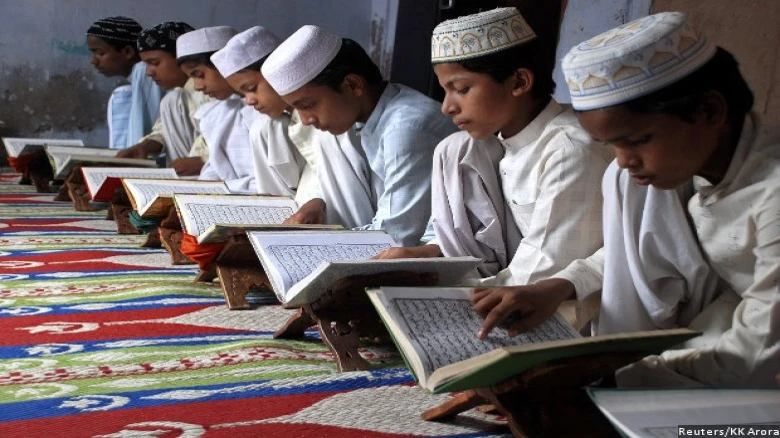In Uttar Pradesh, there are roughly 25,000 madrassas; the Uttar Pradesh Madrassa Education Board recognizes 16,500 of them..........
Digital desk: The Allahabad High Court's decision that the Uttar Pradesh Board of Madarsa Education Act, 2004 was "unconstitutional" because it violated "the principle of secularism" and the fundamental rights guaranteed by Article 14 of the Constitution was stayed by the Supreme Court on Friday.
"Pending the hearing and final disposal of the petitions, the judgement and order of the High Court dated March 22 shall remain stayed," a three-judge bench led by the Chief Justice of India, D.Y. Chandrachud, stated appeals challenging the HC order in a Public Interest Litigation (PIL). The bench scheduled the final hearing for the second week of July.
The Uttar Pradesh Board of Madarsa Education Act, which was passed in 2004, defined madrassa education as instruction in Arabic, Urdu, Persian, Islamic studies, Tibb (traditional medicine), philosophy, and other designated fields. Its goal was to standardize madrassa education.
In Uttar Pradesh, there are roughly 25,000 madrassas; the Uttar Pradesh Madrassa Education Board recognizes 16,500 of them. Among them, the government provides subsidies to 560 madrassas. In addition, the state is home to 8,500 madrassas that are not officially recognized.
Under the titles Kamil and Fazil, respectively, the Madarsa Education Board grants undergraduate and postgraduate degrees. The Madarsa Education Board similarly grants certificates and other academic distinctions, however, this board issues diplomas known as Qari.
Exams for the classes of Alim (Class XII) and Munshi and Maulvi (Class X) are administered by the board. Prescribing courses, textbooks, reference books, and other educational materials (if any) for Tahtania, Fauquania, Munshi, Maulavi, Alim, Kamil, and Fazil is another mandate of the Madarsa Education Board.
The Uttar Pradesh Board of Madarsa Education Act, 2004 was declared "unconstitutional" and in violation of the secularism principle by the Allahabad High Court, which also declared it to be invalid.
The High Court was considering a case that contested the UP Madarsa Board's authenticity and objected to the Minority Welfare Department, rather than the Education Department, being in charge of managing Madarsa.
According to the petitioner and his lawyer, the Madarsa Act violates the fundamental principles of secularism found in the Constitution. It also does not offer all students enrolled in madrasas a universally high-quality education, as required by Article 21-A, or a quality compulsory education up until the age of 14 or Class VIII.
The Uttar Pradesh Board of Madarsa Education Act was placed on temporary stay by the Supreme Court, which stated that the high court's intent was primarily regulatory.
The Supreme Court further declared that the Allahabad High Court's conclusion that the Madarsa will violate secularism is "not prima facie correct."
Notices on the arguments against the high court order were sent to the Uttar Pradesh government, the Center, and other parties by a three-judge bench presided over by Chief Justice D Y Chandrachud.
"The object and purpose of Madarsa board is regulatory in nature and the Allahabad HC is not prima facie correct that establishment of board will breach secularism," the bench, also comprising Justices J B Pardiwala and Manoj Misra, said.
The 2004 Act does not provide for religious teaching, and its goal and character are regulatory, according to the Supreme Court, which stated that HC has misconstructed many of its provisions.

Leave A Comment